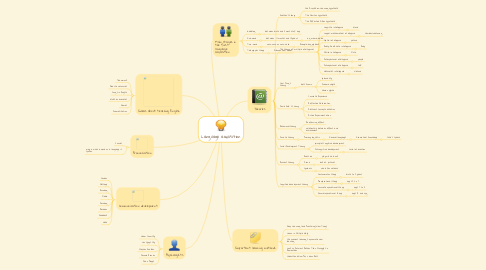
1. Main stages in the first language acquisition
1.1. babbling
1.1.1. between birth and 11 months of age
1.2. One-word
1.2.1. between 11 months and 1.5 years
1.2.1.1. e.g. mama, dada
1.3. Two-word
1.3.1. noun-noun or noun-verb
1.3.1.1. Example: doggie bark
1.4. Telegraphic stage
1.4.1. Discover new words
2. Psychologists
2.1. Noam Chomsky
2.2. Lev Vygotsky
2.3. Stephen Krashen
2.4. Jerome Bruner
2.5. Jean Piaget
3. Ideas about teaching English
3.1. Teamwork
3.2. Didactic resources
3.3. Songs in English
3.4. Written exercises
3.5. Games
3.6. Dramatization
4. Pronunciation
4.1. Sounds
4.2. way in which a word or a language is spoken
5. Communication development
5.1. Sender
5.2. Message
5.3. Encoding
5.4. Media
5.5. Decoding
5.6. Receiver
5.7. Feedback
5.8. Noise
6. Theories
6.1. Krashen's theory
6.1.1. the Acquisition-Learning hypothesis
6.1.2. The Monitor hypothesis
6.1.3. The Affective Filter hypothesis
6.2. The theory of multiple intelligences
6.2.1. Linguistic intelligence
6.2.1.1. Word
6.2.2. Logical-mathematical intelligence
6.2.2.1. Number/reasoning
6.2.3. Spatial intelligence
6.2.3.1. picture
6.2.4. Bodily-Kinesthetic intelligence
6.2.4.1. Body
6.2.5. Musical intelligence
6.2.5.1. Music
6.2.6. Interpersonal intelligence
6.2.6.1. people
6.2.7. Intrapersonal intelligence
6.2.7.1. self
6.2.8. Naturalist intelligence
6.2.8.1. Nature
6.3. Carl Jung´s theory
6.3.1. best known
6.3.1.1. personality
6.3.1.2. Dream analysis
6.3.1.3. Human psyche
6.4. David Kolb´s theory
6.4.1. Concrete Experience
6.4.2. Reflective Observation
6.4.3. Abstract Conceptualization
6.4.4. Active Experimentation
6.5. Behavioral theory
6.5.1. Reinforcing effort
6.5.2. relationship between effort and achievement
6.6. Innate theory
6.6.1. Primary linguistic
6.6.1.1. General languages
6.6.1.1.1. Gramatical knowledge
6.7. Social Development Theory
6.7.1. principles Cognitive development
6.7.2. Full cognitive development
6.7.2.1. social interaction
6.8. Bruner's theory
6.8.1. Enactive
6.8.1.1. play with a book
6.8.2. Iconic
6.8.2.1. look at pictures
6.8.3. symbolic
6.8.3.1. read for reseach
6.9. Cognitive development theory
6.9.1. Sensorimotor stage
6.9.1.1. birth to 2 years
6.9.2. Preoperational stage
6.9.2.1. ages 2 to 7
6.9.3. Concrete operational stage
6.9.3.1. ages 7 to 11
6.9.4. formal operational stage
6.9.4.1. ages 12 and upg
